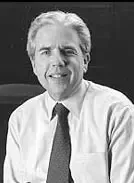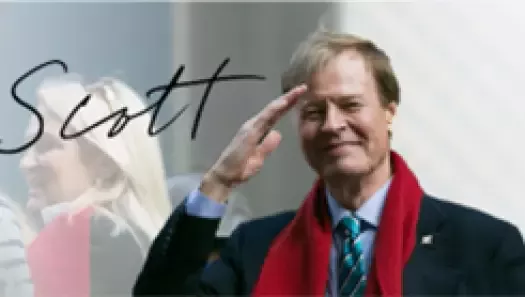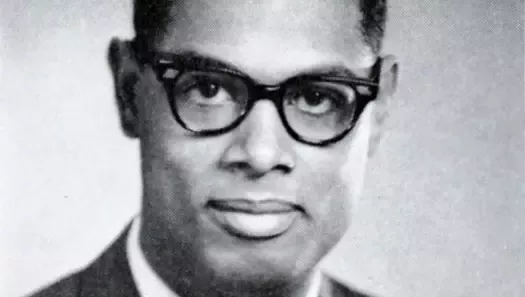WeSalute Awards
HeroVet: Robert Glassman, A Banker Dedicated to Social Justice

Robert Glassman is a banker, and this is the mission statement of the bank he serves as co-chairman: With a sense of inclusion and diversity that extends from the boardroom to the mailroom, Wainwright Bank & Trust Company resolves to be a leading socially responsible bank . . . equally committed to all its stakeholders - employees, customers, communities and shareholders.
Here is a financial institution, a lending institution, a savings institution, that is, as Glassman notes on its Web site, www.wainwrightbank.com, "increasingly seen as part of the vanguard of the social investment movement . . . The bank has attempted to use both its cultural and financial capital to further a vision of a just, tolerant and sustainable society."
A socially conscious bank? One that gives more than lip service to serving the communities whose money sustains it? Yep. And since its founding in 1991 by Glassman and John Plukas, it has acquired a devoted customer base while breaking new ground for what a bank can - and many would argue, ought to - do.
What it does has been significant. The Wainwright Bank has financed more than $140 million in affordable housing and other community development projects, including homeless shelters, food banks, AIDS services, and women’s health projects, in greater Boston. This is an enviable record that most of its competitors are hard-pressed to match.
Its efforts have garnered well-deserved recognition.
"Wainwright’s social lending practices shine as a beacon of hope to the less fortunate among us, to innovators seeking to solve complex social problems, and to people who have refused to abandon their commitment to the neighborhoods of the city," writes shareholder Harvey Fleishman in a not atypical comment.
The U. S. Treasury has cited the Wainwright with a Bank Enterprise Award worth $275,000 - for four years’ running. In 1998, the bank received the national Annual Business Ethics Award for its "commitment to social justice inside and out."
Inspiring TV
The roots of Bob Glassman’s commitment to what he calls "the driving value system of a publicly traded bank" harkens back to the early days of television. As a boy, he recalls having watched the Army/McCarthy hearings on the black-and-white set in his home in Jersey City, New Jersey.
"There, I saw the same voices of intolerance displayed that were later arrayed against the civil rights movement, the anti-war movement, the women’s movement, the gay rights movement, and the civil liberties of people with AIDS. For me, the rights of these groups are all connected threads that weave the fabric of a just society."
For Glassman, doing well in school was the key to opening the doors of success. In this, he didn’t get off to a particularly auspicious start. At the end of his first semester at Jersey City Junior College, he notes, "I received both my marks and a notice that the college would not open next year as they had gone bankrupt."
Enrolling at Rutgers University, from which he would receive two undergraduate degrees, also meant enrolling in the school’s then-mandatory ROTC program. "Soon enough, like many young men in that situation, I found myself upon graduation looking to a future that included a place few of us knew much about back then: Vietnam.
"Glassman went to Vietnam in 1966 and served as a platoon leader. With death and destruction constant companions to the young men and women over there, Glassman looked to a future when his service obligation would be fulfilled.
"I’m not sure I was quite serious when I wrote to the Princeton Educational Testing Service about taking the Business Aptitude Test. Back then, they had a policy that if you were more than 200 miles from a testing site they’d send someone out to administer the test. Half tongue-in-cheek, I told them if they were careful and took a convoy out Route 13, they might find me at a place called Lai Khe.
"We compromised and finally, I traveled into Saigon one day and took the test."
A Unifying Theme
After his tour of duty in Vietnam, and his obligation to the service had ended, Glassman entered the Business School at Harvard University, from which he received his M.B.A. He then embarked on a career that is "successful" by any measure.
Bob Glassman is "particularly gratified that my banking activities, philanthropic pursuits, and personal beliefs have all been able to converge around a single theme: social justice.
"This work, alongside the culture of diversity we’ve developed at the bank, is the most important legacy I contemplate I will leave my children."
It is not his only legacy. Glassman has contributed to his community by serving on the Board of Directors of several organizations, including The Boston Foundation and the Umass Foundation at Boston. He is a member of the mayor’s AIDS Housing Task Force. He established, in 1993, the Robert A. Glassman Scholarship at Harvard Business School to provide financial assistance to a graduate of an inner-city high school.
Perhaps his proudest association is with the William Joiner Center for the Study of War and Social Consequences at the University of Massachusetts in Boston, of which he is a co-founder and on whose Board of Directors he serves.
The Joiner Center promotes reconciliation, bringing together American and Vietnamese writers and poets who once fought against each other and who now find a commonality of purpose and focus in their writing. Joiner, writes author Larry Heinemann, is in many ways responsible for a "cultural rapprochement" between two peoples. "The institutional courage demonstrated by UMass Boston to have developed these relationships 10 years ahead of normalization while facing many obstacles, is an enormous achievement. . . ."
"Harvard may have given me my trade," Glassman said in June 2000 at a dinner honoring recipients of honorary degrees, of whom he was one. "But my 16-year association with Joiner and UMass Boston has given me an education. It has given me the thread that has connected so much together . . . 30 years and 12,000 miles from that first night where the journey all began."



